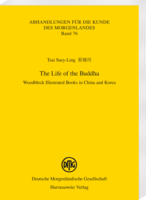|
weitere Titel zum Thema:
Download:
Woodblock illustrated books on the life of the Buddha were printed in antiquity in China and Korea. Today, the books can be found in diverse collections all over the world: some are still in monasteries, others in rare book collections, in museums of ethnology, in research institutes, and in art museums. Their different nature reflects the wide range of aspects on the life of the Buddha. They were occasionally exhibited as art objects, religious documents or as examples of pre-modern media technology. Nowadays, auction houses offer old copies of such books; facsimiles are still being produced for the modern market. Woodblock illustrated books on the life of the Buddha are highly appreciated and yet, modern researchers seldom granted them adequate attention.
Tsai Suey-Ling’s study clarifies the relationships between the various impressions, editions, and compilations of woodblock illustrated books. Korean productions are compared with Chinese prototypes; a “genealogical” table shows the inland and cross-cultural relationship. It also examines artistic and art historical aspects: the sophistication of the design in layout, book, text, and illustration; the background of the artists; the relationship between text and image; and their positions in East Asian art history. Furthermore Tsai examines authorship, provenance, historical circumstances surrounding the production, texts and images, as well as intentions of the authors and sponsors. As a result she points out that the woodblock illustrated books’ various purposes were not only a means of propagating the Buddhist faith, but also transported distinct political, social, economical, and aesthetic ambitions. |






